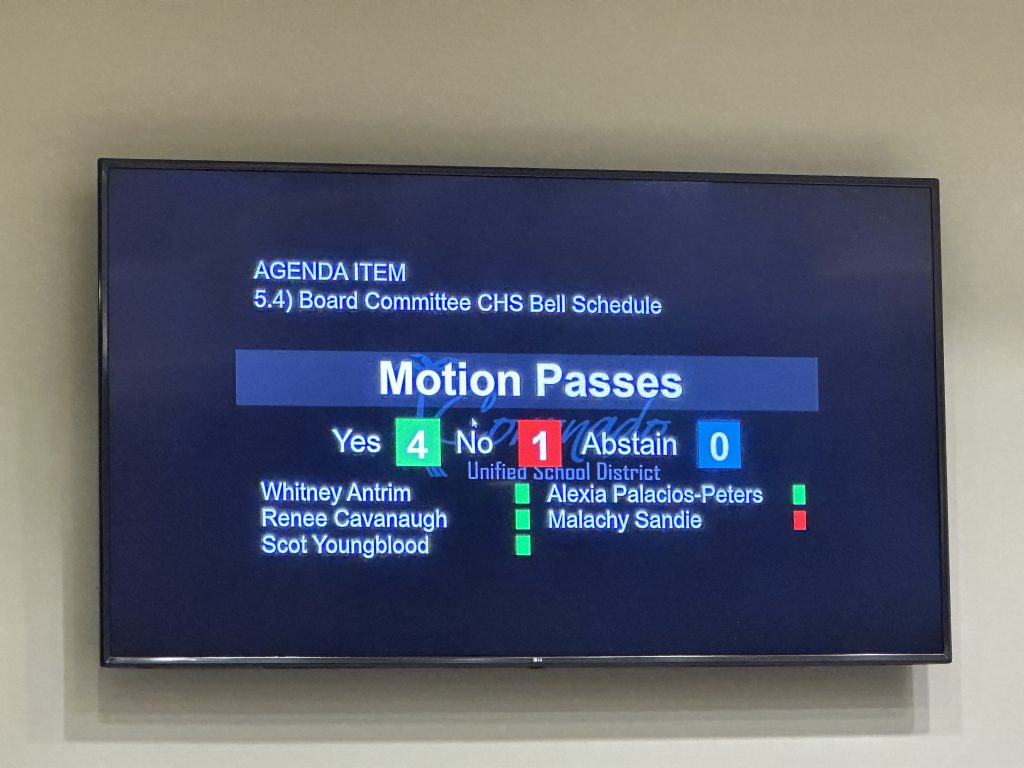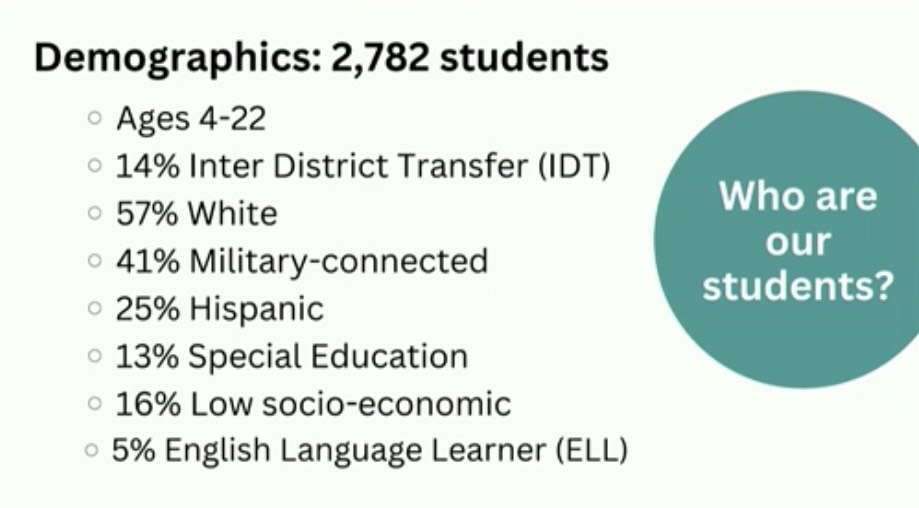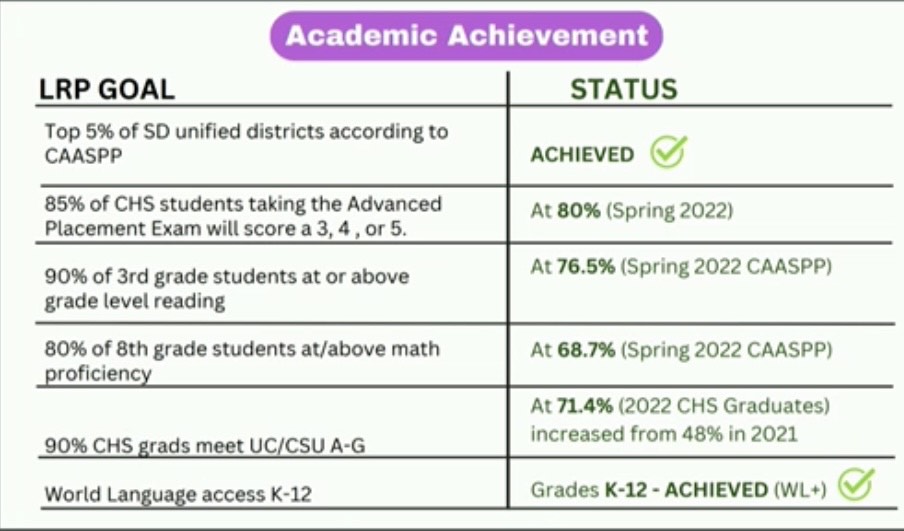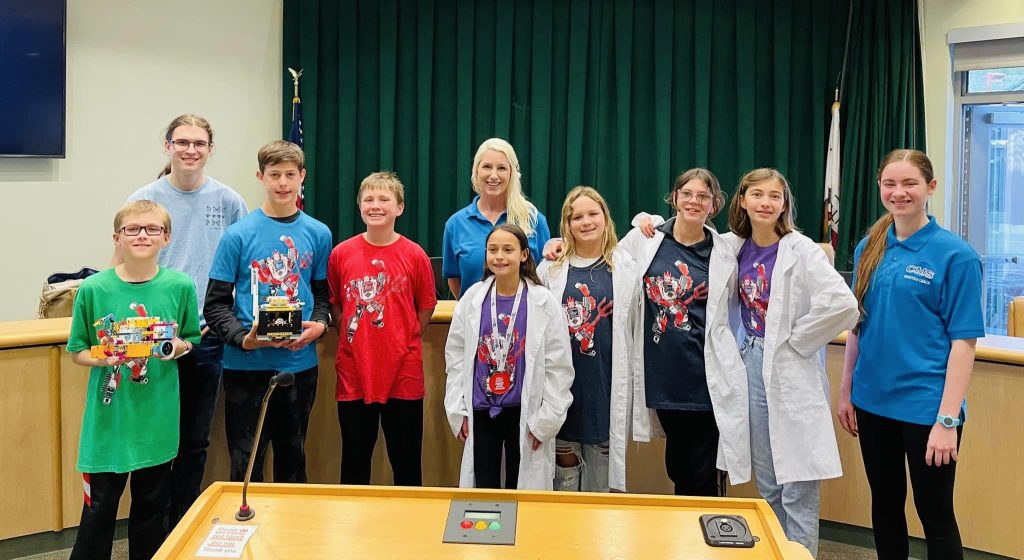The Coronado Unified School District school board trustees met on Thursday, January 19 at District Offices where the board approved the proposal for a 4×4 board subcommittee to evaluate the block scheduling, which is in its second year. The board also approved expenditures for equity training and a rate increase for the Brian Bent Memorial Aquatics Complex (BBMAC). Principal Jenny Moore gave her annual report on Silver Strand Elementary School and the award-winning CMS Robotics Team was recognized for overall excellence.
The trustees spent almost an hour discussing how the proposed 4×4 committee would work. Trustee Dr. Scot Youngblood, who wrote the proposal, said the new scheduling, which took effect in fall 2021, remained a source of controversy and high-interest within the community.
“I think it would be appropriate and beneficial to go through the process of having a committee look at the 4×4,” said Youngblood. “My intention would be something like a 360-degree evaluation, with input from students, teachers, parents and staff. Even if we make no changes, I think we will be in a better place.”
Trustee Mal Sandie said that, despite the problematic timing of AP testing—whereby a student might take an AP class in the fall, and be tested in the spring—overall, the 4×4 schedule was aligned with the district’s goal of student achievement and academic excellence.
“Change is hard,” said Sandie. “But I feel like this proposal is an attempt to take our schools backwards. I don’t want to go backwards. I want to go forward. This [4×4 schedule] directly contributes to our mission of preparing our kids for higher education.”
Trustees Whitney Antrim and Alexia Palacios-Peters said that evaluating the schedule could help the district create the best end-user experience.
“I was sitting on this board when we decided to go forward with this plan in the middle of COVID, with the promise and commitment to support all parties in the implementation,” said Antrim. “Now seems like a good time to see how it’s going.”
Antrim suggested lobbying the College Board to hold some AP tests after the fall semester. Associated Student Body President Luke Johnson echoed the AP testing woes, but said, overall, he liked the schedule.
“I don’t think we should go backwards,” said Johnson. “I think that would send everything into chaos. Some people love the schedule, and some people really don’t like it … I personally love it, but taking APs was hard.”
Sandie, who said that the schedule allowed his son to take more high-level math classes and ultimately gain entrance to West Point, said that it didn’t really matter how many people liked the schedule, because it was aligned with the district’s goals.
“I hear the word ‘like’ a lot, do we ‘like’ it, does everyone ‘like’ it?” said Sandie. “I’m mission-focused … we have a mission, quality education for life, prepare students for higher education, careers and society. That’s why I don’t think we need this committee.”
While Youngblood advocated for an independent 4×4 citizen advisory committee, driven entirely by community members, Antrim, Palacios-Peters and Trustee Renee Cavanaugh agreed it should have board oversight. Ultimately, the proposal passed 4-1 with the stipulation that the committee would have a board liaison. Superintendent Karl Mueller said that the committee would be a “healthy exercise” for the community to engage in.

The board also discussed expenditures for an equity conference, an item that Trustee Youngblood pulled from the consent calendar. Several members of the community made public comments about the equity expenditures.
Jim Fabiszak said that academics—not equity—was the most pressing issue in education, and asked for a clearer definition of what educational equity means to CUSD. Ann Sonne said that championing a politicized concept that focuses on equity of outcome would be a tragic disservice to students.
Youngblood said that the conference was controversial, and the district needed to focus on things that “bring us together, not separate us.”
Trustee Palacios-Peters asked for clarification on the approval process, as the conference for which the funds were to be approved was already underway. According to Deputy Superintendent Donnie Salamanca, such expenditures are authorized if they are in line with the long-range plan, as long as the board ratifies the transactions within 60 days of that expenditure.
Youngblood argued that, due to the controversial nature of the expenditure, the item should have been presented for discussion.
Cavanaugh said that there wasn’t anything controversial about the conference.
“I think if student learning and achievement is our goal, I don’t think that’s controversial,” said Cavanaugh. “If there is a conference that helps teachers or counselors better enable a student to show what he knows, then I think that’s what we’re all looking for.”
The item passed 4-1, with Youngblood voting no.
Principal Jenny Moore from Silver Strand Elementary shared her annual report. She said that mornings at Strand were off to a great start with resumed bus service and free breakfast for all students.
When it comes to school demographics, she said that 79% of Strand students are military-connected. Moore says the school offers programs like Anchored4Life and traditions like the Friday Flag Pole ceremony that help connects peers. A fun fact: because of the school’s large military demographic, the school’s APEX Fun Run fundraiser was able to garner pledges from all 50 states.
“We welcome students at all times of the school year, and support them through transitions,” said Moore.
Moore noted the rising number of special education students, which almost doubled in the last year. She said there were several reasons for this, including post-pandemic testing and catch-up time. Most notably, the school has expanded its special education services, including the addition of a special education specialist, a new classroom, a registered behavior technician, and another full-time psychologist. In addition, the school has built a sensory space in the PE room.
“Having a school that truly welcomes, in public education, all of the people who live in your environment, and having the appropriate supports for them, represents a huge area of growth for us,” said Moore.
Moore shared that Strand is a Title 1 School with access to low-income funding. Currently, the funds are used to support the reading specialist program. She also shared data on CAASP score successes, as well as the focus on social-emotional learning, which is implemented with the Harmony program.
Earlier in the evening, Mueller shared his State of the District report, which is a snapshot of where CUSD is today. When it comes to demographics, Mueller shared that the district as a whole is 41% military-connected. The students who identify as Hispanic have grown from 20% in 2021-2022 to 25% this year.
“This is a growing group in our district,” said Mueller. “We need to challenge ourselves, how will we be responsive to this, and make sure our systems and programs are aligned with our current demographics.”

He said that the district believes that every child, every day is entitled to a connection, a challenge, and a champion.
“Those aren’t just words on the wall,” said Mueller. “We believe that a connection to something greater than oneself is really meaningful to the student, and is something that might get them out of bed in the morning. That might be the CMS Robotics program. That may be a sport. Or a physics teacher. That may be the journalism class.”
He said that the landscape of college admissions has shifted. The emphasis is no longer purely on test scores, and that many colleges and universities are looking for a well-rounded student with a well-rounded experience.
When it comes to celebrations, he said that the K-12 World Language Program was to be applauded, and also that CUSD would rank in the top 5% of all unified school districts. He also mentioned C-Nado, the positive school climate program for character development. In addition, he encouraged stakeholders to stop and enjoy the moment and what the district has, right here, right now.

“If we’re too busy looking behind us, and if we’re too busy looking ahead of us, we’re not taking advantage of what we have right there in front of us, because it’s pretty remarkable,” said Mueller.
In other board business, the trustees voted to approve a rate increase for the BBMAC pool, the first since 2018. (In this time, costs associated with the pool have gone up about 40%, said Salamanca.)
Salamanca also shared the district attendance dashboard. While the average attendance was around 96%, the dashboard showed $650,000 of lost revenue from absences at the four school sites. Youngblood said that it’s important to communicate with parents and students that attendance is how the schools are funded.
“We budget based on passed history, which is roughly at 96% of attendance, so while it may seem jarring to say, hey, we’ve lost out on $650,000, we’ve kind of incorporated that into the budget,” said Salamanca. “But, if more students came to school, we would have more funding to do more of the incredible things we are already doing.”
According to Salamanca, Saturday schools are an option for students to make up missed class time. In addition, Mueller shared that the district would soon announce a Saturday school eBike training in conjunction with the Coronado Police Department.
In reports, ASB President Luke Johnson shared that schools at all campuses were focused on Kindness Week. CMS was busy getting ready for its second dance of the year, and CHS was heading into finals week. In addition, Tiki, the new Islander mascot, was introduced.
Also in reports, Marshall Redding, President of the California School Employees Association in Coronado, shared that classified employees are “the glue that holds the organization together.” Classified employees are generally described as labor workers with specific job duties, who are paid by the hour. This includes those working in administration, accounting, bus drivers, nutrition, security, custodians, librarians, life guards and instructional aids.
Redding encouraged trustees to stop and talk to the classified employees, and get to know them. He invited the trustees to shadow one for a day, but told them to “wear your running shoes.”
In his Long Range Plan update, Mueller shared that plans were underway for an outside vendor to assess school site safety. Trustee Sandie said that, no matter what the district did to make school campuses safer, schools would always remain soft targets.
“Schools, supermarkets and malls are always going to be soft targets,” said Sandie. “We can do [the safety assessment], but please don’t think that our schools are going to be safe because of it. It’s just not realistic.”
Youngblood said that school safety is a matter of degree, and that the assessment would be a healthy undertaking for the district.
“Parents don’t want their elementary school to be a hard target,” said Youngblood. “But I think there are things we can do to make it safer.”
Sandie said that when it comes to the recent school shooting in Uvalde, the report listed factors that contributed to the killings while ignoring an important factor.
“The report didn’t identify the elephant in the room … the fact that an 18-year-old can so easily and legally buy two assault weapons and 2000 rounds of ammunition,” said Sandie.
Earlier in the evening, Shane Schmeichel, Director of Special Programs, introduced Roberta Lenert, Head Coach of the CMS Robotics Team. Lenert shared that there are currently 30 students in the program with 18 coaches. This year, all five teams moved onto regionals, two moved to state competitions, and CMS Robotics is now top 20 in California.
Several students introduced themselves to the board and showed off robots that they built from scratch. There was even a representation of an innovation project, which designed America’s first-ever nuclear waste recycling center.

“CMS Robotics is more than coding and engineering,” said Lenert. “It’s website development, it’s public speaking, it’s community outreach. These students work every single day. We started at two days a week, now we’re up to five, six, seven days a week. It’s lots of hours and dedication.”

Schmeichel also spoke on behalf of Coronado School of the Arts (CoSA), which is currently accepting applications for its 2023-2024 school year. In addition, he invited community members to the 25th Anniversary CoSA Gala at the Island Club on North Island. The event – which takes place on March 11th – features student performances, student art, a sit down dinner, a live auction, a hosted bar and dancing to a live band. Tickets are available here.




